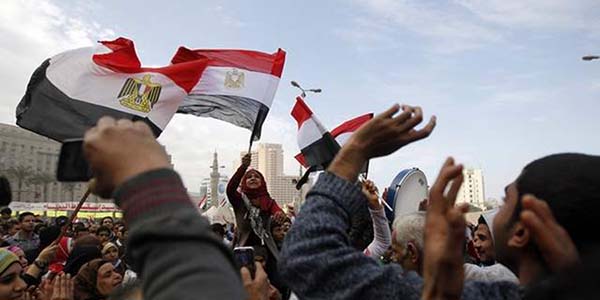The violent demonstrations across the country against Egyptian President, Mohammad Mursi, left seven dead on the first anniversary of presidential election. Oppositions have avoided negotiating with the government in spite of continuous call by Mr. President. On June 30, oppositions had announced to hold huge demonstration against government asking for the resignation of President Mursi and earlier new presidential election.
During Protests police forces during past few days have fired tear gas as the rival groups tussled in the streets and around the Brotherhood headquarters. Two buses of Islamist group were also set on fire causing large plumes of black smoke rising from the surrounding streets. The Interior Ministry urged "revolutionary and political forces" to remain peaceful during the protests, saying in a statement that it had sent riot police to protect property. In a statement, the ministry has told that it sent riot police forces to the headquarters of the party to protect public and private property.
Seemingly, Egypt is kneeling down under weight of its economic and political turmoil. Violent demonstrations and clashes have increasingly turned so familiar to people. The society is deeply divided perhaps not only on one line but several lines. It looks hard to assess the progressive violent demonstrations and clashes between government oppositions and supporters only from political prospective.
If it was the reason, Egyptians should have respected the public consent voted largely in the favor of Islamist party. Their votes set the party in utter dominance regarding other secular, liberal and leftist groups.
Muslim Brotherhood could easily overtake presidential election and sent their nominee, President Muris, to palace without major threat from opposition parties. The only political party that appeared as challenge was National Democratic Party Nominee, Mr. Ahmad Shafi, the ex-Prime Minister during regime of President Hosni Mobarak.
So, when people came to vote for the nominee of political party which was just toppled down by the very people, then the popularity of left, secular and liberal parties can be determined. None of their nominees could win a visible vote and went for the second round.
Similar story was repeated in the parliamentary election. Muslim Brotherhood could easily send most of their nominees in the house while their rivals from other political parties remained behind door. Whatever was the reason, it was not that election was not much transparent. Indeed, fraud was not to an extent to affect the overall result of the election. Opposition parties, instead of marching people into street, should have respected the public decision and only alerted them about possible perversion of political processes.
Meanwhile, we observe that people still have kept their socks up and time and again clash with security forces. While it is reflected that opposition political parties are behind but protestors rarely talked of their affiliation with any political group, instead introduced themselves as real revolutionaries who toppled former President Hosni Mobarak but some others benefitted.
When new generation who merely marched to streets to achieve democracy, people-oriented establishment, and through that reach to economic prosperity, similar to rest of youths across the globe, toppled the regime, there was no well-organized political party to exploit the situation and recline on the chair of power.
Seemingly, with the course of time, some opposition parties have found the chance to strengthen their position and get introduced to civilians through adopting an anti-government status. In another word, incumbency of MB has provided them the chance to build identity in opposition to government. They try that the mistakes of government change into a tribune for their identification. They also have learned to act in unity and to develop enough power to challenge Brotherhood-dominated establishment.
Oppositions feel that President Mursi is not going to realize promises made during the first free presidential election after the collapse of former President Hosni Mubarak’s regime, but after his promulgated decree on November 22 of assuming sweeping power people flooded to Tahrir Square, somehow, similar to what series of demonstration which ended to regime of President Mobarak. They have been calling on President to step down and rescind his decree. In order to appease oppositions, he tried all political initiatives to bring oppositions on negotiating table and mollify them through promises, but bluntly failed.
No doubt, the policies of the ruling party are also blamed for increasing division of the society. The draft of constitution and latter putting it on referendum all created a feeling among Egyptians that the party is looking forward for establishing a Shariah-based government. But as mentioned above what causes people to continue clashing with supporters of the regime and security forces has other reasons too.
If such demonstrations had only political reasons, the continuous call of President Mursi to sit on negotiating table with oppositions and also strong message that he is after developing an Islamic government could have recovered the situation.
What we observe is mayhem and chaos move on despite efforts of government to restore peace and security. Possibly, along with political reasons, there are economic issues which create problem for the government. Years of protests and lack of stability have affected the overall economic well-being. People who were thinking that the former government was corrupt and did not allow economic prosperity come down to public now have become disappointed.
It is likely with progressive uprising, the economic prospective goes further into darkness and thus there will be more civil uprising. So, the government should focus on developing economy in order to get rid of such mass oppositions.

